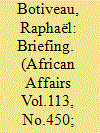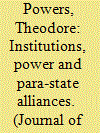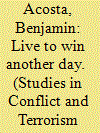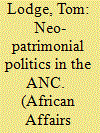| Srl | Item |
| 1 |
ID:
131835


|
|
|
|
|
| Publication |
2014.
|
| Summary/Abstract |
MORE THAN A YEAR AFTER the South African police killed 34 strikers in Marikana, labour unrest continues across the country's mining sector. Industrial actions have targeted platinum giants like Amplats, the world's largest producer, where an 11-day strike over planned retrenchments has just ended and another is looming amid fresh wage talks. Rivalry between the National Union of Mineworkers (NUM) - aligned with the African National Congress (ANC) - and the more recent and militant Association of Mineworkers and Construction Union (AMCU) has also plagued the industry. On 17 October, an NUM branch chairperson at Lonmin - the third largest platinum producer in the world - was shot dead. Another Lonmin NUM shaft steward died in a similar situation on 3 November. A few months ago a former NUM leader who had become the AMCU regional representative in Rustenburg was ambushed - one of several from both sides assassinated since the Marikana massacre. In other words, the 'Framework Agreement for a Sustainable Mining Industry', promoted by South African Deputy President Kgalema Motlanthe and signed by parties to the industry on 3 July 2013, has so far failed to restore peace to the mining sector in Africa's largest economy.
|
|
|
|
|
|
|
|
|
|
|
|
|
|
|
|
| 2 |
ID:
124259


|
|
|
|
|
| Publication |
2013.
|
| Summary/Abstract |
From 1999 to 2008, delays in the adoption of a comprehensive treatment and prevention programme shortened the lives of people living with HIV/AIDS in South Africa. While the slow implementation of antiretroviral therapy has been attributed to a lack of institutional capacity, dissident views on HIV/AIDS and the effects of fiscal austerity, it was also an expression of power. This article analyses how the South African HIV/AIDS movement overcame this exercise of power by the AIDS dissident faction of the African National Congress (ANC) by building an alliance with the South African labour movement and moderate elements within the ruling party. The ANC's dissident faction responded to this by developing para-state partnerships with non-state organisations to support the AIDS dissident agenda. This study highlights the need to expand the para-state concept to take into account a wider range of social formations and the historically particular conditions under which they emerge.
|
|
|
|
|
|
|
|
|
|
|
|
|
|
|
|
| 3 |
ID:
132214


|
|
|
|
|
| Publication |
2014.
|
| Summary/Abstract |
Militant organizations pursue two common aims: to survive and to achieve the goals that define their raison d'être. Yet, elements that sustain the life spans of militant organizations are not necessarily the same components that advance the accomplishment of their core, or "outcome," goals. Further, some organizational practices, such as the use of suicide attacks, generate a tradeoff that bolsters survivability while detracting from the effective pursuit of outcome goals. This study demonstrates that three operating conditions explain variation in the duration and achievement of contemporary militant organizations: receptiveness to tradeoffs, levels of external support, and the nature of adversaries. As such, the unique effects of different operating conditions reveal why many militant organizations survive for long periods of time but only a few achieve the goals that justify their existence.
|
|
|
|
|
|
|
|
|
|
|
|
|
|
|
|
| 4 |
ID:
131809


|
|
|
|
|
| Publication |
2014.
|
| Summary/Abstract |
Following Jacob Zuma's ascension to the presidency in South Africa, the African National Congress (ANC) has been dogged by rumours of escalating corruption and the personalization of power. This article documents these trends and explores three ways of understanding neo-patrimonialism in South Africa's ruling party. First, the article addresses the possibility that such political habits have a long history within the ANC but were restricted during its years in exile and have begun to resurface now that the armed struggle is over. Second, it considers explanations that relate to the party's historical ties to criminal networks and pressures arising from the transition to majority rule and contemporary electoral politics. Finally, the article investigates whether neo-patrimonialism is a reflection of broader tendencies within South African political and economic life. All three factors are found to have played a role in the rise of neo-patrimonial politics, and it is the confluence of these trends that explains why these dynamics have taken such a strong hold on the party.
|
|
|
|
|
|
|
|
|
|
|
|
|
|
|
|